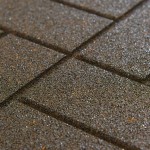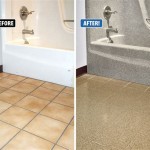Cutting Holes in Tile: A Step-by-Step Guide
Cutting holes in tile is a common task for homeowners, DIY enthusiasts, and professionals alike. Whether you're installing a sink, faucet, or electrical outlet, the ability to accurately and safely cut tile is essential. This guide provides a step-by-step approach to cutting holes in tile, ensuring a successful and professional outcome.
Choosing the Right Tools
The tools needed for cutting holes in tile depend on the size and shape of the hole required. For small, circular holes, a hole saw is the preferred tool. Hole saws are available in various sizes, allowing you to cut holes for fixtures like faucets, outlets, and light switches. For larger, irregular holes, a wet saw or tile cutter with a diamond blade is recommended. These tools provide greater cutting accuracy and control, making them suitable for cutting complex shapes and sizes.
Preparing the Tile
Before starting the cutting process, it's vital to prepare the tile properly. Begin by marking the location of the desired hole on the tile using a pencil or marker. Ensure the markings are accurate and clear. If using a hole saw, drill a pilot hole at the center of the marked area. This pilot hole helps guide the hole saw and prevents the tile from cracking during cutting. For larger holes, use a tile cutter or wet saw to create a rough outline of the desired shape. This pre-cutting action makes the subsequent hole-cutting process more manageable.
Cutting the Hole
Once the tile is prepared, start the cutting process. If using a hole saw, attach the appropriate size hole saw to a drill and secure the tile firmly. Slowly drill through the tile, applying gentle pressure and maintaining a steady pace. Avoid excessive pressure, as this can cause the tile to crack. For larger holes, use a tile cutter or wet saw with a diamond blade. Position the blade on the tile and make slow, controlled cuts along the pre-marked outline. If using a wet saw, keep the cutting area wet to minimize dust and heat generated during cutting.
Finishing Touches
After cutting the hole, it's crucial to smooth out any rough edges and ensure a clean, professional finish. Use a diamond-coated file or sandpaper to gently remove any burrs or imperfections around the edges of the hole. Clean the cutting area thoroughly to remove dust and debris. Depending on the type of tile and the location of the hole, you may need to apply sealant around the edges of the hole to prevent moisture penetration or cracking.
Safety Precautions
Cutting tile can be a hazardous task, so safety should be a top priority. Always wear safety glasses to protect your eyes from flying debris. Use a dust mask to prevent inhaling tile dust, which can be harmful to your respiratory system. When using a wet saw, ensure the water flow is consistent and adequate to keep the cutting area cool and lubricated. Wear gloves to protect your hands from sharp edges and cuts. Finally, always work in a well-ventilated area to minimize the risk of inhaling dust and fumes.
Additional Tips
Here are some additional tips to enhance your tile hole-cutting experience:
- Practice on scrap tile before attempting to cut the actual tile.
- Use a steady hand and avoid rushing the cutting process.
- If working with a wet saw, ensure the blade is sharp and in good condition.
- Clean the tile cutter or wet saw blade regularly to prevent clogging and ensure smooth cutting.
- After cutting the hole, use a sealant to protect the edges of the tile and prevent moisture penetration.

How To Cut Holes In Tile For Shower Fixtures 15 Steps

How To Cut Holes In Tile For Shower Fixtures 15 Steps

How To Cut Holes In Tile For Shower Fixtures 15 Steps

How To Cut Holes In Tiles What You Need Know

How To Cut Tile With Pictures Wikihow

The Ultimate Hole Saws Guide 5 Essential Steps For Drilling Holes In Tiles Without Ing Yucotools

How To Drill Through Ceramic Tiles A Complete Guide Pma Imperio

How To Cut Holes In Tile For Shower Fixtures 15 Steps
How To Drill Holes In Tiles Bathroom Guru

Don T Break It How To Drill Through Tile In 7 Easy Steps
Related Posts








